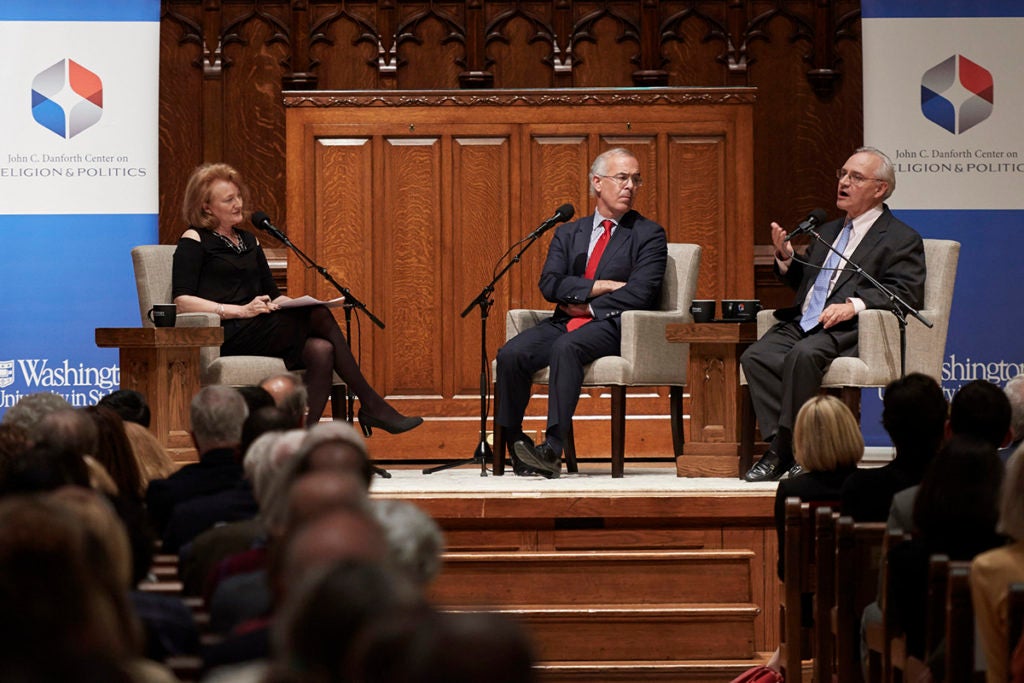
“The Danforth Dialogues: Envisioning the Future of Religion and Politics in America,” with national journalists E.J. Dionne Jr. and David Brooks, was held in Graham Chapel Oct. 8, a day ahead of the presidential debate. (Photo: Dan Donovan/Washington University)
On Saturday afternoon, hundreds of students gathered excitedly on Mudd Field while cable giants MSNBC and Fox News fine-tuned their ephemeral outdoor sets — the weekend site of some of their signature fast-talking, short-segment broadcast shows.
Just steps away, within the stately and grand Graham Chapel, a near-capacity audience slowed down, sat reverently and listened to two-plus hours of respectful and enlightened discourse on weighty and important topics.
The John C. Danforth Center on Religion and Politics served as organizer and host of the “Danforth Dialogues: Envisioning the Future of Religion and Politics in America.” Krista Tippett, host of the Peabody Award–winning “On Being” radio show and podcast, moderated the evening’s discussion.
At the outset, Tippett said, “I want to acknowledge that we find ourselves in a strange, tumultuous political moment. We’re not going to focus on what happened yesterday, or today or what trended in the last 20 minutes, but on the challenge and promise into which we all will be living, as citizens in our political culture and in our society, whoever wins the election on Nov. 8.”
Tippett asked David Brooks, political commentator and op-ed writer for The New York Times, and E.J. Dionne, political writer for The Washington Post, to discuss what she called the spiritual crisis behind our current electoral dynamics.
“The religious enterprise at its deepest is about what binds us together,” Tippett said, “and theology is as much a sophisticated analysis of the human condition as much as it is a conversation about God.”
She pointed out that both men had increasingly over the last decade become two of our country’s most searching thinkers, who very often bring religious questions or wisdom into their reflections on political realities.
“Theology can make sense,” Brooks said, “because it can speak spiritually, emotionally and morally. And so it’s not an academic enterprise, it’s the way to see the world. So it becomes an explanatory tool as much as anything.”
Speaking about the loss of the influence of thoughtful public theologians, Brooks said, “They spoke fluidly about the spirits, the emotions … And I happen to be believe that we are now living in a culture that is over-politicized and under-moralized.”
The conversation covered such concepts as the need for community, the notions of sin, the concept of family and marriage.
Dionne spoke passionately about religion, the family and social justice. “If you care about family values, you have to care about social justice,” he said, “because one of the reasons the family is under such pressure is because of the way in which the economy is a battering ram against the family, particularly among the folks who have lost jobs that once supported families.”
Earlier in the evening, in the session “Religion and the Common Good,” Tippett spoke with Eboo Patel, founder and president of Interfaith Youth Core, and Natasha Trethewey, a Pulitzer Prize–winning poet and former poet laureate of the United States.
She asked Patel and Trethewey to share their reactions to the toxic language and sentiment that has surfaced during this campaign.
Patel stated that the larger question for him is: How do we nurture a healthy and religiously diverse democracy?
“Democracy is where you can make personal convictions public,” he said. “Diversity isn’t just the differences you like. Diversity is the disagreements.”
He went on to stress that you cannot sustain a diverse democracy, you cannot have America, unless people are willing to disagree on one set of ideas but find common ground and work together on others.
Trethewey explained that through reading lots of other poets for a soon-to-be-published anthology, she has seen some of the most horrible distortions of our contemporary moment made beautiful.
“It begins for me in the language itself … In the elegant language of poetry, in the elegant envelope of form … a poem … can take language that has been used in uncivil discourse and apply it to a higher ennobling goal,” she said.
The three examined topics such as feeling empathy for others; opening inter-faith discourse on deep issues; telling a broader narrative of American experience; and using the language of religion to talk about the secular.
These important and in-depth discussions could have gone on for much longer, which is exactly why the Danforth Center on Religion and Politics was founded at Washington University.
“Part of the center’s charge from its founding in 2010 has been to plan a major event in connection with the U.S. presidential election. This year’s ambitious program showcases the center’s core commitment to fostering a vibrant intellectual community that promotes rigorous scholarship, models civil dialogue and educates students and the public about the intersections of American religion and politics,” said center director Marie Griffith, the John C. Danforth Distinguished Professor in the Humanities.
“All of us at the center are dedicated to modeling respectful debate among divergent viewpoints and stirring discussions that might identify new trajectories for religion and politics in American life.”